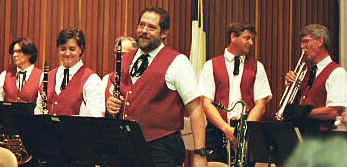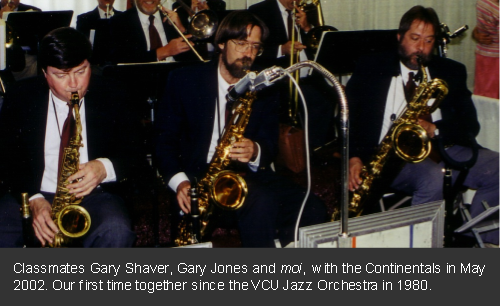Why Am I Doing This?
 If
you've ever seen The Music Man, you
will recall the words of Professor Harold Hill as he teaches the four bickering members of
the River City School Board to sing in barbershop harmony. To their wives he says,
"Ladies, from now on you will never see one of these men without the other
three." The mayor's wife replies, "You're wrong, Prof. Hill. These men have
hated each other for the last fifteen years." Through the rest of the show they are
inseparable. While this is not a true story, it does bring out a basic truth about music.
It brings people together. Making music is an intimate shared experience, and those who
are able to participate have something in their lives that most people can't imagine.
People of drastically different views and backgrounds might not get along anywhere else,
but they will bond when playing music.
If
you've ever seen The Music Man, you
will recall the words of Professor Harold Hill as he teaches the four bickering members of
the River City School Board to sing in barbershop harmony. To their wives he says,
"Ladies, from now on you will never see one of these men without the other
three." The mayor's wife replies, "You're wrong, Prof. Hill. These men have
hated each other for the last fifteen years." Through the rest of the show they are
inseparable. While this is not a true story, it does bring out a basic truth about music.
It brings people together. Making music is an intimate shared experience, and those who
are able to participate have something in their lives that most people can't imagine.
People of drastically different views and backgrounds might not get along anywhere else,
but they will bond when playing music.
 But in order to have this experience, musicians must
have the skills with which to get together. Many musicians play by ear and can't read
music. Many others read music and can't play by ear. Somewhere we need to bridge this gap,
and I'm publishing this page primarily for that purpose. I want to spread the common-sense
musical knowledge that is so essential to the players of band instruments if they want to
keep playing after graduation. There are so many fine players who abandon their
instruments each year--if only they had learned the basic musical skills that most guitar
players take for granted.
But in order to have this experience, musicians must
have the skills with which to get together. Many musicians play by ear and can't read
music. Many others read music and can't play by ear. Somewhere we need to bridge this gap,
and I'm publishing this page primarily for that purpose. I want to spread the common-sense
musical knowledge that is so essential to the players of band instruments if they want to
keep playing after graduation. There are so many fine players who abandon their
instruments each year--if only they had learned the basic musical skills that most guitar
players take for granted.
Despite excellent school music programs with
professional instructors, most players of band and orchestra instruments are isolated from
the making of popular music at the most ordinary levels. While some are simply satisfied
with minimal playing skills, others are held back by the fact that this type of playing
involves individual exploration, and many students simply don't know where to start. My
goal here is to provide some starting points to get the ball
rolling. These are found in the Jam School section. I also
want to provide online help for younger players who are studying music. This is why online
help is provided for the Master Theory Workbook. I also
want to help parents find their way through the snarl of products on the market today.
This is the purpose of the Consumer Pages.
Dedication
This website is dedicated to my mother, Barbara C. Cole,
who taught me much of what I pass on here. Mom celebrated her 45th anniversary
in 2003 as
Organist for Northside Baptist Church in
Mechanicsville, VA. In her longtime role as universal accompanist for songs, prayers and
eulogies, her improvisations taught me that there is so much to music other than what's
written on the page--and other than what features you personally as a musician. As my Mom
demonstrates, good taste is the nobler goal.
A good example of this was my dad, Gilford A. Cole, to
whom these music pages are also dedicated. As if it wasn't enough just to tolerate (and
finance) a family of musicians for all these years, Dad went one better by becoming Mom's
ultimate student. With no prior experience, Dad learned to sing and read music and became
a mainstay in the bass section of the church choir. Never one for the spotlight, he used
his good humor and competence to keep his section in place, on pitch and down to earth.
Not bad for a guy who didn't consider himself a musician. We lost Dad in May 2002.
Selflessness as a musician is a rare thing that I've
had the opportunity to see a lot of. I hope that some of the information on these pages
will help to produce more practical teachers and saavy team players--like my Mom and Dad.
Home
Email me
 If
you've ever seen The Music Man, you
will recall the words of Professor Harold Hill as he teaches the four bickering members of
the River City School Board to sing in barbershop harmony. To their wives he says,
"Ladies, from now on you will never see one of these men without the other
three." The mayor's wife replies, "You're wrong, Prof. Hill. These men have
hated each other for the last fifteen years." Through the rest of the show they are
inseparable. While this is not a true story, it does bring out a basic truth about music.
It brings people together. Making music is an intimate shared experience, and those who
are able to participate have something in their lives that most people can't imagine.
People of drastically different views and backgrounds might not get along anywhere else,
but they will bond when playing music.
If
you've ever seen The Music Man, you
will recall the words of Professor Harold Hill as he teaches the four bickering members of
the River City School Board to sing in barbershop harmony. To their wives he says,
"Ladies, from now on you will never see one of these men without the other
three." The mayor's wife replies, "You're wrong, Prof. Hill. These men have
hated each other for the last fifteen years." Through the rest of the show they are
inseparable. While this is not a true story, it does bring out a basic truth about music.
It brings people together. Making music is an intimate shared experience, and those who
are able to participate have something in their lives that most people can't imagine.
People of drastically different views and backgrounds might not get along anywhere else,
but they will bond when playing music.  But in order to have this experience, musicians must
have the skills with which to get together. Many musicians play by ear and can't read
music. Many others read music and can't play by ear. Somewhere we need to bridge this gap,
and I'm publishing this page primarily for that purpose. I want to spread the common-sense
musical knowledge that is so essential to the players of band instruments if they want to
keep playing after graduation. There are so many fine players who abandon their
instruments each year--if only they had learned the basic musical skills that most guitar
players take for granted.
But in order to have this experience, musicians must
have the skills with which to get together. Many musicians play by ear and can't read
music. Many others read music and can't play by ear. Somewhere we need to bridge this gap,
and I'm publishing this page primarily for that purpose. I want to spread the common-sense
musical knowledge that is so essential to the players of band instruments if they want to
keep playing after graduation. There are so many fine players who abandon their
instruments each year--if only they had learned the basic musical skills that most guitar
players take for granted.